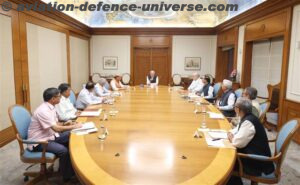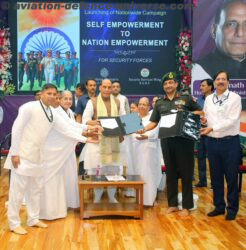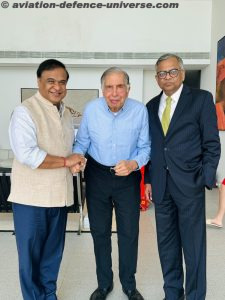
- The Icon of Integrity and Compassionate Leadership
By Sangeeta Saxena
New Delhi. 09 October 2024. The day ended on a sad note for India. The visionary who redefined business with a human touch, Ratan Tata, a name that resonates with excellence, philanthropy, and purposeful leadership, not just a titan of industry but a beacon of hope and progress for millions, the Chairman Emeritus of Tata Sons, Ratan Tata embarked on his celestial journey . His legacy transcends business success where he stands as an enduring symbol of ethical leadership, national pride, and global respect.
For an aviation enthusiast there couldn’t have been a been a more exciting event of life, than seeing the Tata’s taking back Indian national carrier Air India into its fold. And for a defence journalist there couldn’t have been a bigger news than Tata Advanced Systems becoming the rock solid foundation for India’s aatmanirbhar drive and Make in India journey.
Ratan Tata’s love for aviation was embedded in a journey soaring beyond business . He harbored a deep and enduring passion for aviation. This passion, nurtured since his childhood, not only defined his personal pursuits but also played a significant role in shaping the future of India’s aviation industry. Ratan Tata’s love for aviation began in his formative years. Growing up, he would watch aircraft take to the skies with wonder and admiration. As a boy, he was fascinated by the mechanics of flight and the sheer power and beauty of airplanes. His enthusiasm for flying was further fueled by his family’s legacy—after all, his great-grand-uncle J.R.D. Tata was India’s first licensed pilot and the founder of Tata Airlines, which later became Air India.
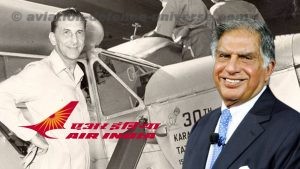
Tata’s love for aviation wasn’t just a fleeting fascination. In 1981, at the age of 44, he earned his pilot’s license, realizing a lifelong dream of flying. While running one of India’s largest conglomerates, he frequently took to the skies, piloting various types of aircraft, including private jets and helicopters. His love for aviation was more than a hobby—it became a parallel career, allowing him to fuse his leadership acumen with his piloting skills.
Ratan Tata didn’t just enjoy flying, he excelled at it. In 2007, he made history by becoming the first Indian to fly an F-16 fighter jet, a momentous event that showcased both his flying expertise and daring spirit. Tata took off in the supersonic aircraft at the Aero India in Bangalore, piloting the jet with poise and precision, despite the complex demands of flying such an advanced machine.
This achievement wasn’t just a personal milestone, it also signified his support for technological advancements in India’s defense and aviation sectors. Tata’s interest in fighter jets, commercial planes, and helicopters reflected his commitment to exploring opportunities for innovation, not only in his personal life but for India’s future in aerospace technology.
While Ratan Tata’s passion for aviation took him to the skies, his influence on the industry was deeply rooted in his vision for India’s growth. Under his leadership, Tata Group sought to re-enter the aviation sector after decades of absence. In the early 2000s, Tata was at the forefront of attempts to re-establish a domestic airline, working with Singapore Airlines in an effort to launch a joint venture. Although regulatory hurdles initially stalled the project, Tata’s determination was unwavering.
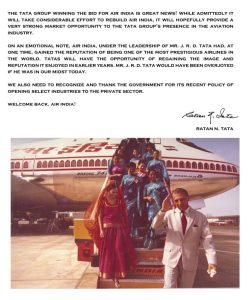 In 2013, Tata Group finally made its mark on Indian skies by launching AirAsia India in partnership with AirAsia Berhad, followed by the establishment of Vistara, a joint venture with Singapore Airlines in 2015. Vistara, known for its premium service and operational excellence, became one of India’s most admired airlines under his vision, providing a world-class flying experience for millions of passengers.
In 2013, Tata Group finally made its mark on Indian skies by launching AirAsia India in partnership with AirAsia Berhad, followed by the establishment of Vistara, a joint venture with Singapore Airlines in 2015. Vistara, known for its premium service and operational excellence, became one of India’s most admired airlines under his vision, providing a world-class flying experience for millions of passengers.
Ratan Tata’s dedication to India’s aviation industry wasn’t just about business; it was about bringing global standards to Indian skies. His personal love for aviation influenced the ethos of these ventures, embedding a culture of excellence, safety, and innovation.
Tata’s love for aviation also echoed the pioneering spirit of J.R.D. Tata, who founded Tata Airlines in 1932 and laid the foundation for India’s civil aviation industry. Ratan Tata often expressed how deeply his uncle’s legacy influenced his own passion for flying. He continued to celebrate J.R.D.’s achievements, viewing his own involvement in aviation as a continuation of that legacy. The skies were not just a space for Ratan Tata to experience freedom—they were a bridge to the past, carrying forward a tradition of innovation and ambition.
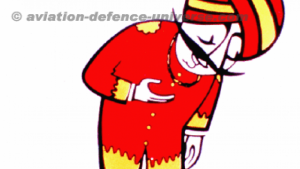
For Ratan Tata, aviation was not just a passion but a symbol of exploration, freedom, and ambition. His flying experiences allowed him to break free from the confines of daily business challenges and experience the thrill of navigating uncharted paths, literally and metaphorically. In a life dedicated to building industries, nurturing startups, and improving millions of lives, aviation was the space where Tata could pursue his love for adventure and innovation. Even as he aged, his enthusiasm for flying remained undiminished. As a member of the esteemed Flying Club, Tata kept his pilot’s license current well into his later years, often speaking of the joy and tranquility he found in piloting an aircraft.
Ratan Tata’s love for aviation was far more than a personal interest; it was an integral part of his character, mirroring his boundless curiosity and vision for the future. His efforts to re-shape India’s aviation landscape, coupled with his personal achievements as a pilot, underscore his adventurous spirit and his relentless pursuit of excellence. Whether flying a supersonic jet or overseeing the creation of world-class airlines, Tata always looked to the skies—not just to conquer them, but to elevate India’s presence within them. His legacy, both in business and aviation, will continue to inspire future generations to aim higher and dream bigge
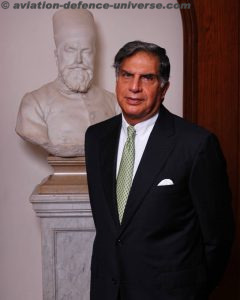 Born into the illustrious Tata family, Ratan Tata has carried forward a 150-year-old legacy with grace, compassion, and an unwavering commitment to uplifting society. Under his leadership, the Tata Group transformed into a global conglomerate, with landmark acquisitions such as Air India, Tetley, Corus, and Jaguar Land Rover, propelling India into the international business spotlight. Yet, for all his business acumen, what sets Ratan Tata apart is his relentless pursuit of bettering the lives of others, particularly those less fortunate. His pioneering efforts in launching the Tata Nano, an affordable car that aimed to provide mobility to the common Indian, reflect his visionary approach to inclusive growth. Ratan Tata’s belief in making products and services accessible to all was driven not by profit margins, but by a genuine desire to empower the people of India.
Born into the illustrious Tata family, Ratan Tata has carried forward a 150-year-old legacy with grace, compassion, and an unwavering commitment to uplifting society. Under his leadership, the Tata Group transformed into a global conglomerate, with landmark acquisitions such as Air India, Tetley, Corus, and Jaguar Land Rover, propelling India into the international business spotlight. Yet, for all his business acumen, what sets Ratan Tata apart is his relentless pursuit of bettering the lives of others, particularly those less fortunate. His pioneering efforts in launching the Tata Nano, an affordable car that aimed to provide mobility to the common Indian, reflect his visionary approach to inclusive growth. Ratan Tata’s belief in making products and services accessible to all was driven not by profit margins, but by a genuine desire to empower the people of India.
Beyond the boardroom, Ratan Tata’s contributions to philanthropy are profound. Under his leadership, Tata Trusts channeled resources into healthcare, education, rural development, and disaster relief, making a tangible difference in countless lives. Whether it was stepping forward during national crises, supporting scientific research, or funding educational initiatives, his philanthropic endeavors embody the spirit of service to humanity.
Ratan Tata’s quiet dignity, humility, and compassion have earned him the admiration and love of millions, both in India and around the world. He is known for his ability to connect with people from all walks of life, treating everyone—from a corporate executive to a factory worker—with the same respect and kindness. His moral compass, guided by integrity and simplicity, has remained unshaken despite the global spotlight.

As a leader, Ratan Tata has always looked beyond immediate gains, focusing on long-term impact and value creation. His visionary approach has transformed the Tata Group into a global entity while staying true to its core values of ethics, social responsibility, and nation-building. His legacy is not just the multibillion-dollar empire he helped shape, but the millions of lives he touched and the industries he inspired.
In a world where the lines between success and ethics can often blur, Ratan Tata remains a towering figure of principled leadership. His life and work are a reminder that true greatness is measured not just by achievements, but by the positive difference one makes in the world. As a leader, philanthropist, and humanitarian, Ratan Tata is a testament to the power of vision, compassion, and unwavering dedication to the greater good.
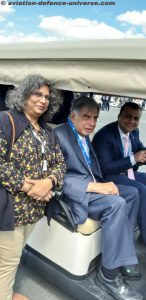 At times I feel God has really blessed me with moments of life I could only have dreamt of . An honour to have sat on the same round table to discuss Indo-French Aviation Ties at a Paris Air Show. I will tell the truth, I was mesmerised. And a bigger honour to be ferried by the thorough gentleman Ratan Tata to the HAL chalet in his golf cart. My ten minutes of individual chat where I told him that both my sons have worked for TCS in their professional journey, he asked-why did they leave, is it difficult for Tata’s brand to retain youngsters? The conversation continued. I requested him -Sir please get back Air India. So he said-yes we are thinking. Honour to have lived these moments.
At times I feel God has really blessed me with moments of life I could only have dreamt of . An honour to have sat on the same round table to discuss Indo-French Aviation Ties at a Paris Air Show. I will tell the truth, I was mesmerised. And a bigger honour to be ferried by the thorough gentleman Ratan Tata to the HAL chalet in his golf cart. My ten minutes of individual chat where I told him that both my sons have worked for TCS in their professional journey, he asked-why did they leave, is it difficult for Tata’s brand to retain youngsters? The conversation continued. I requested him -Sir please get back Air India. So he said-yes we are thinking. Honour to have lived these moments.
Today, we celebrate not just a businessman, but a man whose values and actions have shaped the very fabric of modern India. Ratan Tata’s contributions will continue to inspire generations, and his legacy will forever remain etched in the hearts of those who believe in building a better world.
ADU pays a heartfelt tribute to Ratan Tata the man who lived and loved India.






































